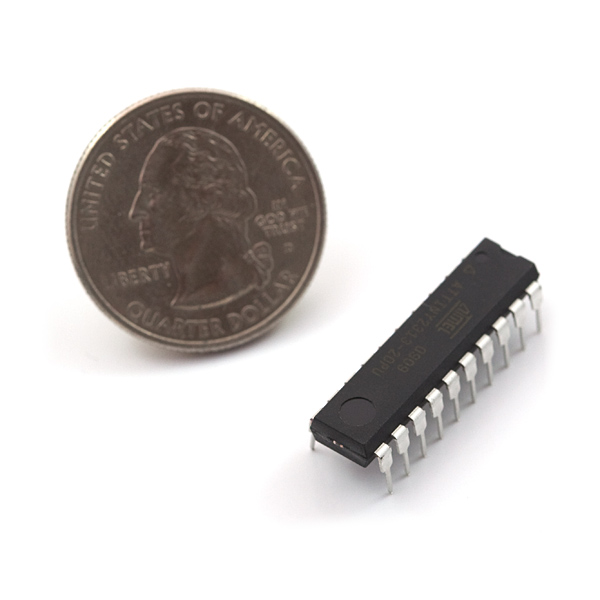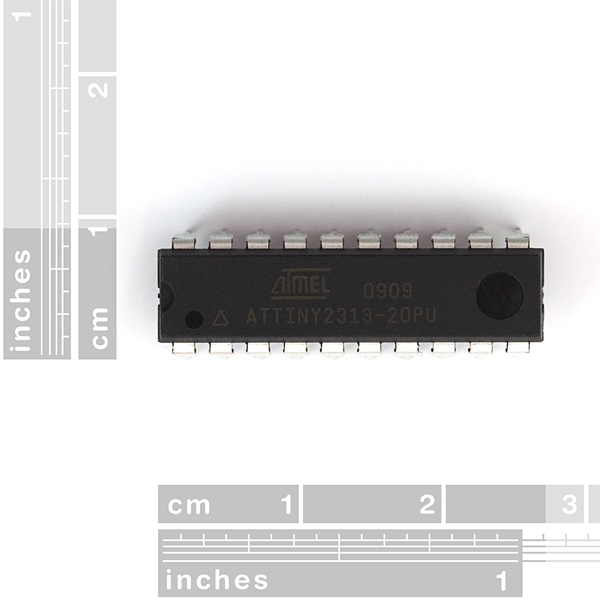AVR 20 Pin 20MHz 2K - ATtiny2313
Atmel's ATtiny2313 8-Bit Processor. 2K of program space and 15 I/O lines. UART compatible pins. Runs up to 20MHz with external crystal. Package can be programmed in circuit.
- [D](http://cdn.sparkfun.com/datasheets/Components/General IC/doc2543s.pdf) [atasheet](http://cdn.sparkfun.com/datasheets/Components/General IC/doc2543s.pdf)
AVR 20 Pin 20MHz 2K - ATtiny2313 Product Help and Resources
Core Skill: Soldering
This skill defines how difficult the soldering is on a particular product. It might be a couple simple solder joints, or require special reflow tools.
Skill Level: Rookie - The number of pins increases, and you will have to determine polarity of components and some of the components might be a bit trickier or close together. You might need solder wick or flux.
See all skill levels
Core Skill: Programming
If a board needs code or communicates somehow, you're going to need to know how to program or interface with it. The programming skill is all about communication and code.
Skill Level: Rookie - You will need a better fundamental understand of what code is, and how it works. You will be using beginner-level software and development tools like Arduino. You will be dealing directly with code, but numerous examples and libraries are available. Sensors or shields will communicate with serial or TTL.
See all skill levels
Core Skill: Electrical Prototyping
If it requires power, you need to know how much, what all the pins do, and how to hook it up. You may need to reference datasheets, schematics, and know the ins and outs of electronics.
Skill Level: Rookie - You may be required to know a bit more about the component, such as orientation, or how to hook it up, in addition to power requirements. You will need to understand polarized components.
See all skill levels
Comments
Looking for answers to technical questions?
We welcome your comments and suggestions below. However, if you are looking for solutions to technical questions please see our Technical Assistance page.
Customer Reviews
No reviews yet.



Will you be carrying a 20 pin DIP socket soon?
i'm longtime arduino user but i never breadboarded the attiny chips, this would be my first... i assume this should work fine but i'll ask a newb question...
can i use the adafruit cc3000 wifi breakout module the same way that i would on a full arduino? is this mostly true for all arduino compatible components?
thanks.
Does this have an Eagle part?
Looks like it's present in the generic Atmel AVR library: ftp://ftp.cadsoft.de/eagle/userfiles/libraries/avr-6.lbr
the product card link no longer works.
That should be fixed soon. Thanks for catching that!
http://www.atmel.com/devices/ATTINY2313.aspx
Any plans to sell the ATtiny261? Am In incorrect that the 261 is basically the "newer" version of the 2313, giving up the built-in serial for more ADC channels?
Can anybody tell me the avrdude CMD line to write the fuse bits to put a 16 M Hz crystal on this MCU? This calculator only has up to 8 M Hz crystal http://www.engbedded.com/fusecalc/
Something like this: avrdude -p usbtiny -c t2313 -U lfuse:w:0xce:m -U hfuse:w:0xdf:m -U efuse:w:0xff:m
I did this and now the MCU is locked up.
can we put an arduino bootloader in it?? like the uno bootloader???
Sort of. Not the bootloader, but you can program it with Arduino. Here's a link. It's fairly easy! There's also stuff for ATTiny85's on that site.
would this work with the msp-exp430 lunch pad? http://www.sparkfun.com/products/10020
Could you load the Arduino bootloader on this?
Yes...but it's much better to get yourself a $15 ISP programmer to use with these bare chips. Something like this: https://www.sparkfun.com/products/9825
In the Arduino IDE the only difference you'll notice is you select an option from the "Tools->Programmer" menu instead of a COM port. You get more features than COM though, eg. You can set 'fuse' settings on the chips (to select clock sources, etc. (which you'll need to do with this chip unless you want it locked at 1mHz)
You also don't lose a couple of K of flash memory to the bootloader - very important when you only have 2K of program space!
Yes. See this thread.
Okay. Thanks.<br />
You can put it on ATTiny's: <br />
http://hlt.media.mit.edu/wiki/pmwiki.php?n=Main.ArduinoATtiny4585
I don't believe you can... that would be the atmega168 and atmega328.